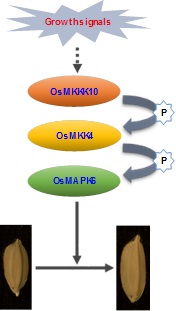Rice is an important cereal crop worldwide, and grain size is a key factor determining grain yield in rice. Several genes regulating grain size have been identified in rice. However, the genetic and molecular mechanisms that set grain size remain largely unknown in rice.
Recently, researchers from LI Yunhai’s group in the Institute of Genetics and Developmental Biology (IGDB), Chinese Academy of Sciences (CAS), collaborated with researchers from YAO Shanguo’s group and TIAN Zhixi’s group in IGDB and researches from CHAI Tuanyao’s group in University of Chinese Academy of Sciences, reported that a MAPK cascade signaling regulates grain size in rice.
MAPK signaling pathways have been characterized to play important roles in multiple processes of plant growth and development and defense responses. The MAPK cascade contains at least three kinases: a MAPK kinase kinase (MKKK), a MAPK kinase (MKK) and a MAPK. Previous study of LI Yunhai’s group showed that loss-of-function mutant of OsMKK4 (smg1) forms small grains in rice.
In a recent study, they identify a gain-of-function mutant of OsMKK4, which forms large grains. In addition, they also identified the smg2 mutant, which exhibits similar small-grain phenotype as smg1. SMG2 encodes OsMKKK10. Overexpression of constitutively active OsMKKK10 leads to large grains. Biochemical analysis showed that OsMKKK10 could sequentially phosphorylate and activate OsMKK4 and OsMAPK6. Further analyses showed that enhanced activity of OsMAPK6 results in large grains, while decreased activity of OsMAPK6 leads to small grains. Genetic analysis showed that OsMKKK10, OsMKK4 and OsMAPK6 function in a common pathway to control grain size.
There analyses revealed that OsMKKK10, OsMKK4 and OsMAPK6 act as a cascade to promote grain growth.
The findings are published online in Molecular Plant entitled “Control of grain size and weight by the OsMKKK10-OsMKK4-OsMAPK6 signaling pathway in rice” on April 24, 2018.
This work is supported by grants from the National Basic Research Program of China, the National Natural Science Foundation of China, and the Chinese Academy of Sciences.
Figure. A model of the OsMKKK10-OsMKK4-OsMAPK6 cascade-mediated control of grain size in rice (Image by IGDB)
Contact:
Dr. LI Yunhai
Institute of Genetics and Developmental Biology (IGDB), Chinese Academy of Sciences
 Figure. A model of the OsMKKK10-OsMKK4-OsMAPK6 cascade-mediated control of grain size in rice (Image by IGDB)Contact:Dr. LI YunhaiInstitute of Genetics and Developmental Biology (IGDB), Chinese Academy of SciencesEmail: yhli@genetics.ac.cn
Figure. A model of the OsMKKK10-OsMKK4-OsMAPK6 cascade-mediated control of grain size in rice (Image by IGDB)Contact:Dr. LI YunhaiInstitute of Genetics and Developmental Biology (IGDB), Chinese Academy of SciencesEmail: yhli@genetics.ac.cn CAS
CAS
 中文
中文




.png)
